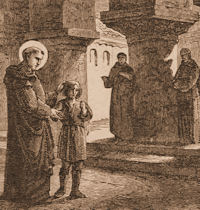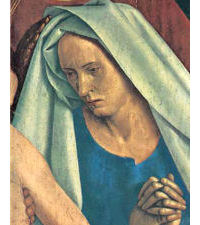Ordinary Time: September 6th
Wednesday of the Twenty-Second Week of Ordinary Time
Other Commemorations: St. Eleutherius, Abbot (RM)
» Enjoy our Liturgical Seasons series of e-books!
Mary suffered because of her intimate union with Christ, on account of our sins, and on behalf of her spiritual children. Devotion to the Mother of Sorrows and the Seven Sorrows of Mary encourages us to flee from sin and inflames our desire to do penance and make reparation so as to console the Hearts of Jesus and Mary.
— The Catholic Faith, John O'Connell
Historically today is the feast of St. Eleutherius, abbot of St. Mark's monastery near Spoleto in the Italian province of Perugia, he was the friend of St. Gregory who mentions him several times in his Dialogues.
Meditation for the Month of September: Our Lady of Sorrows
The liturgy puts on the lips of Our Lady of Sorrows these touching words: "O you who pass by the way, attend and see if there be any sorrow like to my sorrow." Yes, her grief was immeasurable, and was surpassed only by her love, a love so great that it could encompass that vast sea of sorrow. It can be said of Mary, as of no other creature, that her love was stronger than death; in fact, it made her able to support the cruel death of Jesus.
"Who could be unfeeling in contemplating the Mother of Christ suffering with her Son?" chants the Stabat Mater; and immediately it adds, "O Mother... make me feel the depth of your sorrow, so that I may weep with you. May I bear in my heart the wounds of Christ; make me share in His Passion and become inebriated by the Cross and Blood of your Son." In response to the Church's invitation, let us contemplate Mary's sorrows, sympathize with her, and ask her for the invaluable grace of sharing with her in the Passion of Jesus. Let us remember that this participation is not to be merely sentimental—even though this sentiment is good and holy—but it must lead us to real compassion, that is, to suffering with Jesus and Mary. The sufferings God sends us have no other purpose.
The sight of Mary at the foot of the Cross makes the lesson of the Cross less hard and less bitter; her maternal example encourages us to suffer and makes the road to Calvary easier. Let us go, then, with Mary, to join Jesus on Golgotha; let us go with her to meet our cross; and sustained by her, let us embrace it willingly, uniting it with her Son's.
—Excerpted from Divine Intimacy, Fr. Gabriel of St. Mary Magdalen, O.C.D.
St. Eleutherius
 A wonderful simplicity and spirit of compunction were the distinguishing virtues of this holy sixth century abbot. He was elected to preside Saint Mark’s monastery near Spoleto, and favored by God with the gift of miracles.
A wonderful simplicity and spirit of compunction were the distinguishing virtues of this holy sixth century abbot. He was elected to preside Saint Mark’s monastery near Spoleto, and favored by God with the gift of miracles.
A child who was confided to the monastery, to be educated there after having been delivered by the Abbot from a diabolical possession, appeared to everyone to be entirely exempt from further molestations. And Saint Eleutherius chanced to say one day: “Since the child is among the servants of God, the devil dares not approach him.” These words seemed to savor of vanity, and thereupon the devil again entered into and tormented the child. The Abbot humbly confessed his fault and undertook a fast, in which the entire community joined, until the child was again freed from the tyranny of the fiend.
Saint Gregory the Great, finding himself unable to fast on Holy Saturday on account of extreme weakness, called for this Saint, who was in Rome at the time, to offer up prayers to God for him that he might join the faithful in the solemn practice of that day’s penances. Saint Eleutherius prayed with many tears, and the Pope, when they came out of the church, felt suddenly strengthened and able to accomplish the fast as he desired. The same Pope, remarking that the Abbot was said to have raised a dead man to life, added: “He was so simple a man, one of such great penance, that we must not doubt that Almighty God granted much to his tears and his humility!” After resigning his abbacy, Saint Eleutherius died in Rome in Saint Andrew’s monastery, about the year 585.
—Excerpted from Vie des Saints pour tous les jours de l’année, by Abbé L. Jaud (Mame: Tours, 1950); Little Pictorial Lives of the Saints, a compilation based on Butler’s Lives of the Saints and other sources by John Gilmary Shea (Benziger Brothers: New York, 1894)
Highlights and Things to Do:
- Read this short account from the Dialogues by St. Gregory (Book 3, Chapter 33).
- Read more about St. Eleutherius:






